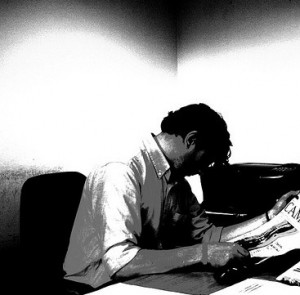(Note: Since this post appeared, the Recover Life from Depression site has been combined with this one. The posts referred to are now at Storied Mind, and the links below will take you to them.)
I’ve recently completed a series of posts at the Recover Life site about handling the effects depression at work. I’ve written about this topic here as well, especially in this post about changing careers. The new series offers more detail on three dimensions of the problem: recognizing the symptoms, adapting to depression at your present job and making more fundamental changes in your worklife.
The only strategy that helped me was the most extreme, switching to a much different type of work. Although it took me far too long to recognize its effect, stress from a demanding profession intensified my illness and delayed recovery for years. Once I retired and stopped the blasting noise of that work, I could set my own pace and spend more time on the activities that helped me get control over depression.
Researchers like Robert Sapolsky have identified several factors that turn the brain’s stress response into a chronic condition rather than the brief survival strategy it was meant to be. Unfortunately, they characterize the working lives of most people these days.
- Daily life at work feels out of your control
- Things are unpredictable
- There are no outlets for stress
- You have no social support at work
If you work in an environment that keeps up the stress level, you may have to find a new job in a less damaging workplace. When that doesn’t help relieve depression, you may have to consider a different line of work, one that will greatly reduce the daily pressure. As I found, however, even that may not be the end of the story.
After changing careers and devoting myself to writing, I continued to put stress on myself. I had lived so long with deep feelings of inadequacy that I felt driven to use work as one way to make up for being less than I needed to be. Fortunately, this tendency has been much more manageable because I have had control over what I do, and work has lost its unpredictability. But it’s something I have to stay alert to, and I think many have a similar problem.
In keeping with the purpose of Recover Life from Depression, these posts emphasize the practical side of dealing with depression at work. They offer specifics on what to look and options for change. I hope you’ll find them helpful and let me know what you think.
How have you tried to adapt to work while living with depression?



I just graduated college last year, and had to drop a semester and then file for disability due to my depression. I somehow mustered the energy and strength to graduate. I landed what I thought would be a “stress free” job as a receptionist, in order to get experience before I go to grad school, and also to give myself some time to get better before I start school again. I quit my job on Tuesday. My depression has taken over. And the work place was not accommodating, and didn’t understand. Mental Illness is not taken seriously, so I was thought of as weak and frankly, a cry baby. What is interesting is that before my episode hit, my job was relatively stress free. Then the depressive cycle gradually took over, and made my job a living hell- every little task took so much every, and became immensely stressful. I have changed my major in college, and career path so many times, and I realize now it is always after a major depressive episode. My depression is taking away everything from me that makes me who I am, everything that I used to be proud of. I used to be proud of my success in school, and now I am barely getting by- and now I am only 23 and it is taking my career from me too. I feel lost and now have no direction. It makes it even harder to get out of this episode with all the stress this depression has caused. I have no income, and I don’t think I will be stable enough to ever hold a job, let alone start a grad a school program in August.
How do people do it??
Hello, Leah –
I’m really sorry to hear what depression has done to your work life. The attitudes about mental illness are so bad in so many places – and make it that much harder to keep going. I hope you’re wrong about not being stable enough to ever hold a job. Have you gotten any treatment for depression? Perhaps the severity of the episodes can be reduced enough in the near term to enable you to continue your education. Universities, especially public ones, have to be a lot more sensitive to mental illness than the average workplace and should accommodate your impaired ability to handle a workload. I hope you’ll stay in touch here and let us know how you’re doing.
All my best to you — John
All of my woriklife I have studied the income and employment of old people. When I started in the 1960’s the main problem was compulsory retirement. Many men, especially professional employees, were forced to retire when they reached 65 or earlier. Often there were decent pensions (gone now) and adjusting to an unfinished career was difficult, and employers gave a cheap watch or fountain pen, a hearty slap on the back, and good wishes. There was golf, and travel. If you look at the figures, the conditions today are about the same, except there are 15 per cent or so of the elderly who still hang on. For many, the remaining years are are filled with errors, mistakes, advise that it is times to stop, withdrawal of decision-making power, and regret so that some develop and a kind of terminal depression. A feeling of diminishing self-confidence, of growing incompetence, more mistakes, and subtle and not so subtle feedback indicating that your colleagues think you are not up to the job. I think many older people finally retire with the sense that they have failed. The rest of life is far less interesting. It is often spent in useless activity. One realizes that he is keeping younger, more competent people from deserved promotions,. Many of us try to write — but so did Kant who filled reams with indecipherable useless babble. There are no drugs or treatments for terminal depreession. It lasts the whole life because there is nothing the dying mind can do to restore the thrill of doing valuable work. Yeats wrote that this was no country for an old man. Many or us are trapped inside our skulls, increasingly unable to express ourselves and our feelings, and tend to be ignored and rarely consulted. We feel intensely the loss of friends and family, until one day, if we live long enough, we realize that we are a last leaf, and everyone you grew up with and competed against have blown away.
There’s alcohol, of course, and codeine, oxycontin, hydrocodone, and ambien, generously prescribed. For some, there is religion and for others, pain. But for many, perhaps most, there is a sense of loss, of regret, of sorrow for “friennds locked in death’s dateless night.” But even this fades into the oblivion that closes many lives.
Hi, Hugh –
That’s a pretty bleak picture, and I count my blessings that retirement has been just the opposite for me. Getting out of a high stress line of work – which I had more and more trouble with as depression worsened – has led me to a new career that I love. So I feel like I have that new lease on life people talk about. I did go through the wincing experience of being taken less seriously in the last few years at my former profession – but that was as much about my declining performance as age itself. I really am very fortunate.
John
This interview on working while depressed was particularly helpful: http://www.therenegadewriter.com/2011/04/11/the-depressed-writer-an-interview-with-julie-fast-author-of-get-it-done-when-youre-depressed/ I bought the book mentioned in the intro. So far it’s pretty good, but the tips are not too different from what’s included in the interview.
Hi –
Thanks for the link to the Julie Fast interview. I’m a great fan of hers, and of Get It Done When You’re Depressed. I’ve found only two books so far that are devoted entirely to handling depression in your worklife – and hers is the only one I know that gives you so many specific ideas. I especially like her discussion of the method she used to write the book as her way of adapting work style to the limitations imposed by depression.
Thanks too for introducing my to the Renegade Writer site.
John
Thanks for this post. This is one area that often gets overlooked when talking about depression. I’m glad you are drawing attention to it.
Hi –
Thanks for your comment. It is a huge problem, but you’re right – there aren’t many online discussions or books devoted to it. Usually, though, you’ll find powerful descriptions in the personal narratives about living with depression.
John